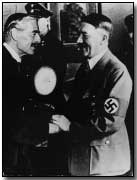





Neville Chamberlain - “Peace in our time.”
Adolf Hitler - “Our enemies are little worms, I saw them in Munich.”
It is appropriate to remember that Chamberlain was the CONSERVATIVE "voice" of the Tory party at the time...and it took determined opposition from within the party to finally oust the blighter, as noted in this valuable historical account:

Here are some excerpts of two apt reviews thereto:
David Cannadine - The Washington Post…vivid and compelling…Troublesome Young Men describes and celebrates the efforts of Chamberlain's opponents within his own Conservative Party. These Tory rebels finally succeeded in bringing the prime minister down after a famous debate in the House of Commons in early May 1940 in which Leo Amery ended his powerful speech by quoting the terrible words that Oliver Cromwell had used to dismiss the Long Parliament 300 years before: "You have sat too long here for any good you have been doing! Depart, I say, and let us have done with you. In the name of God, go!"
Chamberlain grudgingly resigned, and Winston S. Churchill succeeded him, convinced that destiny had nurtured him and prepared him for what would soon be his finest hour. Yet while this may all seem inevitable in retrospect, there was nothing predestined about it at the time.
Publishers Weekly
In 1930s England, faced with the gathering menace of fascism, 30 or so junior members of Parliament understood that Hitler would not be dissuaded by Prime Minister Chamberlain's policy of appeasement. Their rebellion against their leader and the "elderly mediocrities" of their own Conservative Party is the subject of Olson's absorbing book. The forces opposed to Chamberlain were initially inhibited by party loyalty and the ferocious reprisals threatened against anyone who challenged the prime minister. Olson traces how Hitler's continuing depredations (Austria, Czechoslovakia, Poland) served to recruit more insurgents in the House of Commons and galvanize those shamed by England's inaction. Olson's story picks up energy as she reviews the events of 1940, when at long last Chamberlain was replaced by Churchill. Olson is interested in the moral imperatives driving her protagonists. The dominant figure in the narrative, of course, is Churchill, who despised Chamberlain's defeatism but served loyally in his cabinet until Chamberlain's forced resignation. Infused with the sense of urgency felt by the young Tories, Olson's vivid narrative of a critical generational clash leaves the reader wondering what might have happened had they prevailed earlier on. (Apr.)
It is really past time for the gloves to come off about the RATs...and those who have been spineless appeasers or, those such as Chuck Hagel, backstabbingly abetted them within the Republican party.
And frankly, some of the same problems still persist amongst those who nominally claim to support the war or the troops.